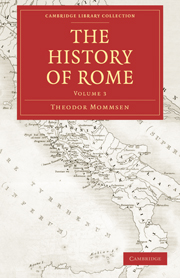Book contents
- Frontmatter
- PREFATORY NOTE
- Contents
- BOOK FOURTH: THE REVOLUTION
- CHAPTER I THE SUBJECT COUNTRIES DOWN TO THE TIMES OF THE GRACCHI
- CHAPTER II THE REFORM MOVEMENT AND TIBERIUS GRACCHUS
- CHAPTER III THE REVOLUTION AND GAIUS GRACCHUS
- CHAPTER IV THE RULE OF THE RESTORATION
- CHAPTER V THE PEOPLES OF THE NORTH
- CHAPTER VI THE ATTEMPT OF MARIUS AT REVOLUTION AND THE ATTEMPT OF DRUSUS AT REFORM
- CHAPTER VII THE REVOLT OF THE ITALIANS AND THE SULPICIAN REVOLUTION
- CHAPTER VIII THE EAST AND KING MITHRADATES
- CHAPTER IX CINNA AND SULLA
- CHAPTER X THE SULLAN CONSTITUTION
- CHAPTER XI THE COMMONWEALTH AND ITS ECONOMY
- CHAPTER XII NATIONALITY, RELIGION, AND EDUCATION
- CHAPTER XIII LITERATURE AND ART
- CORRECTIONS
CHAPTER XIII - LITERATURE AND ART
Published online by Cambridge University Press: 05 October 2010
- Frontmatter
- PREFATORY NOTE
- Contents
- BOOK FOURTH: THE REVOLUTION
- CHAPTER I THE SUBJECT COUNTRIES DOWN TO THE TIMES OF THE GRACCHI
- CHAPTER II THE REFORM MOVEMENT AND TIBERIUS GRACCHUS
- CHAPTER III THE REVOLUTION AND GAIUS GRACCHUS
- CHAPTER IV THE RULE OF THE RESTORATION
- CHAPTER V THE PEOPLES OF THE NORTH
- CHAPTER VI THE ATTEMPT OF MARIUS AT REVOLUTION AND THE ATTEMPT OF DRUSUS AT REFORM
- CHAPTER VII THE REVOLT OF THE ITALIANS AND THE SULPICIAN REVOLUTION
- CHAPTER VIII THE EAST AND KING MITHRADATES
- CHAPTER IX CINNA AND SULLA
- CHAPTER X THE SULLAN CONSTITUTION
- CHAPTER XI THE COMMONWEALTH AND ITS ECONOMY
- CHAPTER XII NATIONALITY, RELIGION, AND EDUCATION
- CHAPTER XIII LITERATURE AND ART
- CORRECTIONS
Summary
Literary reaction
The sixth century was, both in a political and a literary point of view, a vigorous and great age. It is true that we do not find in the field of authorship any more than in that of politics a man of the first rank; Nævius, Ennius, Plautus, Cato, gifted and lively authors of distinctly-marked individuality, were not in the highest sense men of creative talent; nevertheless we perceive in the soaring, stirring, bold straiu of their dramatic, epic, and historic attempts, that these are based on the gigantic struggles of the Punic wars. Much is only artificially transplanted, there are various faults in delineation and colouring, the form of art and the language are deficient in purity of treatment, Greek and national elements are quaintly conjoined; the whole performance betrays the stamp of its scholastic origin and wants independence and completeness; yet there exists in the poets and authors of that age, if not the full power to reach their high aim, at any rate the courage to compete with and the hope of rivalling the Greeks. It is otherwise in the epoch before us. The morning mists fell; what had been begun in the fresh feeling of the national strength hardened in war, with youthful want of insight into the difficulty of the undertaking and into the measure of their own talent, but also with youthful delight in and love to the work, could not be carried further now, when on the one hand the dull sultriness of the approaching revolutionary storm began to fill the air, and on the other hand the eyes of the more intelligent were gradually opened to the incomparable glory of Greek poetry and art and to the very moderate artistic endowments of their own nation.
- Type
- Chapter
- Information
- The History of Rome , pp. 445 - 478Publisher: Cambridge University PressPrint publication year: 2010First published in: 1863



